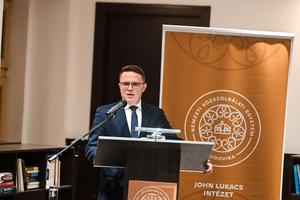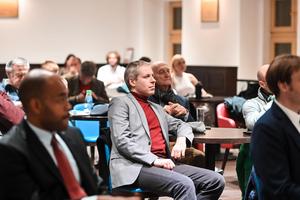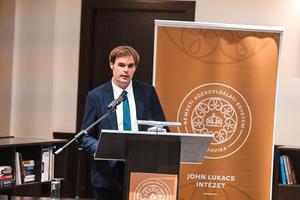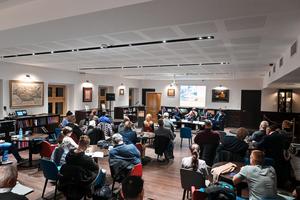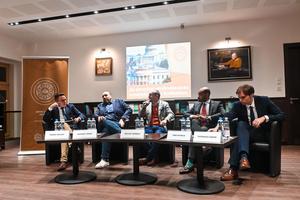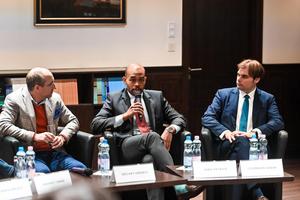On November 12, the Ludovika University of Public Service (LUPS) hosted a discussion event in the John Lukacs Lounge, organized by the Eötvös József Research Center’s (EJRC) John Lukacs Institute. The event aimed to evaluate the outcomes of the U.S. presidential election.
Balázs Tárnok, Director of Research at the LUPS EJRC John Lukacs Institute, explained that this event was the first in a series connected to the Hungarian Science Festival. Addressing the U.S. elections, he highlighted that the November 5 election was significant not only for the presidential race but also for congressional and senatorial elections. He emphasized that the goal in the coming weeks is to provide a comprehensive assessment of the election's impact, particularly focusing on Hungarian foreign policy, security policy, and relations with China. According to his assessment, Donald Trump achieved a landslide victory.
Gábor Csizmazia, a research fellow at the LUPS John Lukacs Institute, analyzed the election results in detail. He noted that Trump performed well among voters aged 18–28. While public opinion polls were questioned for their reliability, Csizmazia believes they closely reflected reality. Democrats dominated in large cities, whereas rural areas strongly supported Republicans. The Republican campaign appeared more focused and organized than its counterpart.
During the subsequent roundtable discussion, Tamás Baranyi, Strategic Director at the Hungarian Institute for Foreign Affairs and Trade (IFAT), pointed out that while the election result was unsurprising, its scale was noteworthy, highlighting the Democrats' loss of 12 million votes. Baranyi observed that Kamala Harris fell short during the campaign; her attempt to present herself as a cheerful figure proved ineffective, with her messages being hard to follow. In contrast, Trump delivered clear and consistent messages and frequently appeared on podcasts, a strategy Harris did not adopt. Baranyi emphasized Trump’s strong legitimacy and significant leverage, suggesting that Hungary and Poland could become key players in Republican foreign policy moving forward.
Gergely Szilvay, senior editor at Mandiner, stressed that Trump managed to disrupt existing trends, penetrating traditional Democratic strongholds. For instance, he gained majority support among Spanish-speaking men and doubled his share of the African American vote compared to four years ago.
Foreign policy expert Patrice Yaro described the election outcome as a monumental political victory. “Trump is only the second president in history to return to the White House,” Yaro remarked, noting that his seamless nomination within the party was key to his success. However, Yaro disagreed with the characterization of Trump’s victory as a landslide, comparing it instead to Barack Obama’s 2008 win, which he considered a true landslide.
Yaro also analyzed the Democratic Party’s situation, asserting that Kamala Harris played only a minor role in the election and emphasizing the necessity of leadership renewal within the party. Gábor Csizmazia added that the election revolved around economic conditions and identity politics. While the U.S. economy performed well on paper, voters’ perceptions told a different story. He highlighted Trump’s strategy of visiting battleground states and traditionally hostile Republican areas, as well as participating in interviews where he faced challenging questions. These efforts, according to Csizmazia, contributed significantly to his success.
Text: Éva Harangozó
Photo: Dénes Szilágyi

